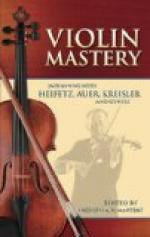“An artist will never become great through mere imitation, and never will he be able to attain the best results only by methods adopted by others. He must have his own initiative, although he will surely profit by the experience of others. Of course there are standard ways of approaching the study of violin technic; but these are too well known to dwell upon them: as to the niceties of the art, they must come from within. You can make a musician but not an artist!
REPERTORY AND PROGRAMS
“Which of the master works do I like best? Well, that is rather hard to answer. Each master work has its own beauties. Naturally one likes best what one understands best, I prefer to play the classics like Brahms, Beethoven, Mozart, Bach, Mendelssohn, etc. However, I played Bruch’s G minor in 1913 at the Leipzig Gewandhouse with Nikisch, where I was told that Joachim was the only other violinist as young as myself to appear there as soloist with orchestra; there is the Tschaikovsky concerto which I played in Berlin in 1912, with the Berlin Philharmonic Orchestra with Nikisch. Alsa Bruch’s D minor and many more. I played the Mendelssohn concerto in 1914, in Vienna, with Safonoff as conductor. Last season in Chicago I played the Brahms concerto with a fine and very elaborate cadenza by Professor Auer. I think the Brahms concerto for violin is like Chopin’s music for piano, in a way, because it stands technically and musically for something quite different and distinct from other violin music, just as Chopin does from other piano music. The Brahms concerto is not technically as hard as, say, Paganini—but in interpretation!... And in the Beethoven concerto, too, there is a simplicity, a kind of clear beauty which makes it far harder to play than many other things technically more advanced. The slightest flaw, the least difference in pitch, in intonation, and its beauty suffers.
“Yes, there are other Russian concertos besides the Tschaikovsky. There is the Glazounov concerto and others. I understand that Zimbalist was the first to introduce it in this country, and I expect to play it here next season.
“Of course one cannot always play concertos, and one cannot always play Bach and Beethoven. And that makes it hard to select programs. The artist can always enjoy the great music of his instrument; but an audience wants variety. At the same time an artist cannot play only just what the majority of the audience wants. I have been asked to play Schubert’s Ave Maria, or Beethoven’s Chorus of Dervishes at every one of my concerts, but I simply cannot play them all the time. I am afraid if program making were left altogether to audiences the programs would become far too popular in character; though audiences are just as different as individuals. I try hard to balance my programs, so that every one can find something to understand and enjoy. I expect to prepare some American compositions for next season. Oh, no, not as a matter of courtesy, but because they are really fine, especially some smaller pieces by Spalding, Cecil Burleigh and Grasse!”




